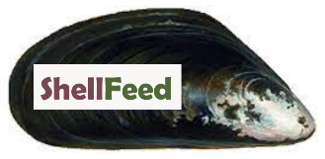
Background: About 92% of the raw materials used in Norwegian aquafeeds are currently imported. Shellfish can be a valuable local marine resource, but are regularly contaminated with algal toxins.
Objective: Provide knowledge about the toxicity of the algal toxins (OA/DTXs and STXs) in salmon after dietary exposure, and potential carry-over of these toxins or their metabolites into fish fillets or by-products
Publications and Presentations
- Poster:
Samdal, I.A., Johny, A., Gjelstad, K.S., Krzyszton, A.; Fæste, C.K., Solhaug, A., Eriksen, G.S., Kuiper, R.V., Ruyter, B.S., Berge, G.M., Thomas, K.M., Carron, P., Miles, M.
Mussels in fish feed – are algal toxins a concern?
Presented at the 21th International Conference on Harmful Algae (ICHA 2025), Punta Arenas, Chile, 19–24 October 2025. - Master thesis:
Britt Van Grootenbrulle. Development of a saxitoxin specific cell assay, based on fish cells: an adaptation of the mouse N2a neuroblastoma assay. 73 s. Juni 2024.
(Erasmus student from Ghent University in Belgium. Work done at Norwegian Veterinay Institute at Ås, Norway) - Popular scientific article in Forskning.no:
Jørgensen, Vilde. Forskere vil finne ut om det trygt å spise fisk som har spist giftige blåskjell. Forskning.no 15. Mars 2024 - Presentation at national seminar:
Samdal, I.A., Johny, A., Fæste, C.K., Solhaug, A., Eriksen, G.S., Ivanova, L., Rangel-Huerta, O.D., Ruyter, B.S., Romarheim, O.H., Berge, G.M. Blåskjell i fiskefôr – men hva med algetoksiner?
Presentation at 16. Norske Fiskeriernæringsseminaret, Grand Selskapslokaler, Bergen. 11–12 March 2024.
Project partners: Norwegian Veterinary Institute, Nofima, National Research Council of Canada
Project periode: 2023-2027
Funding: FHF
Public funding: 11 mill. NOK
